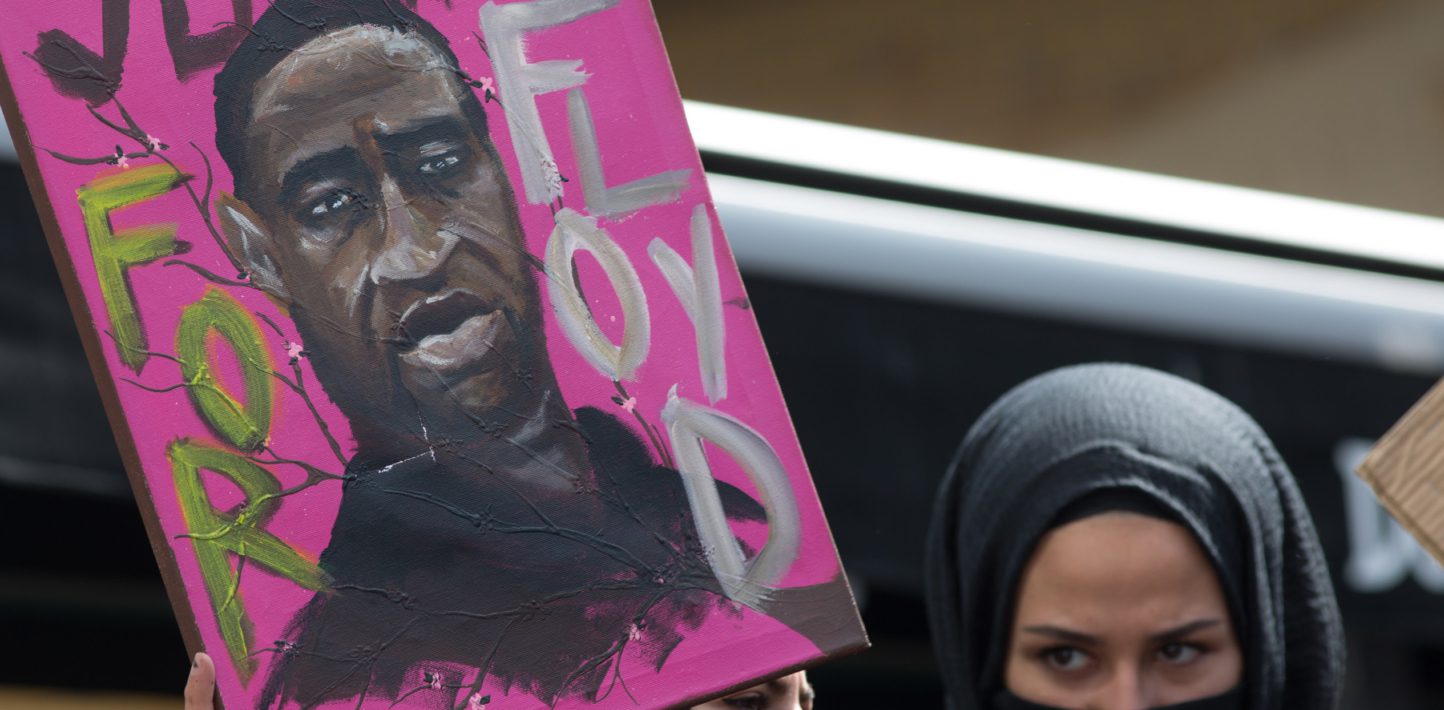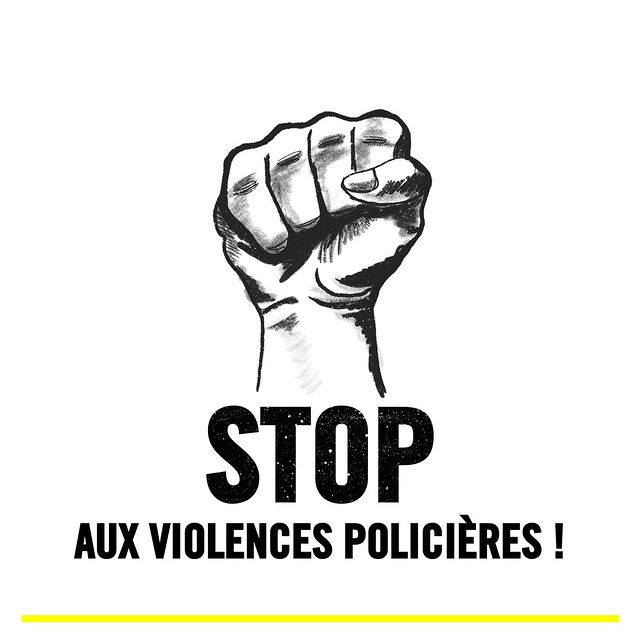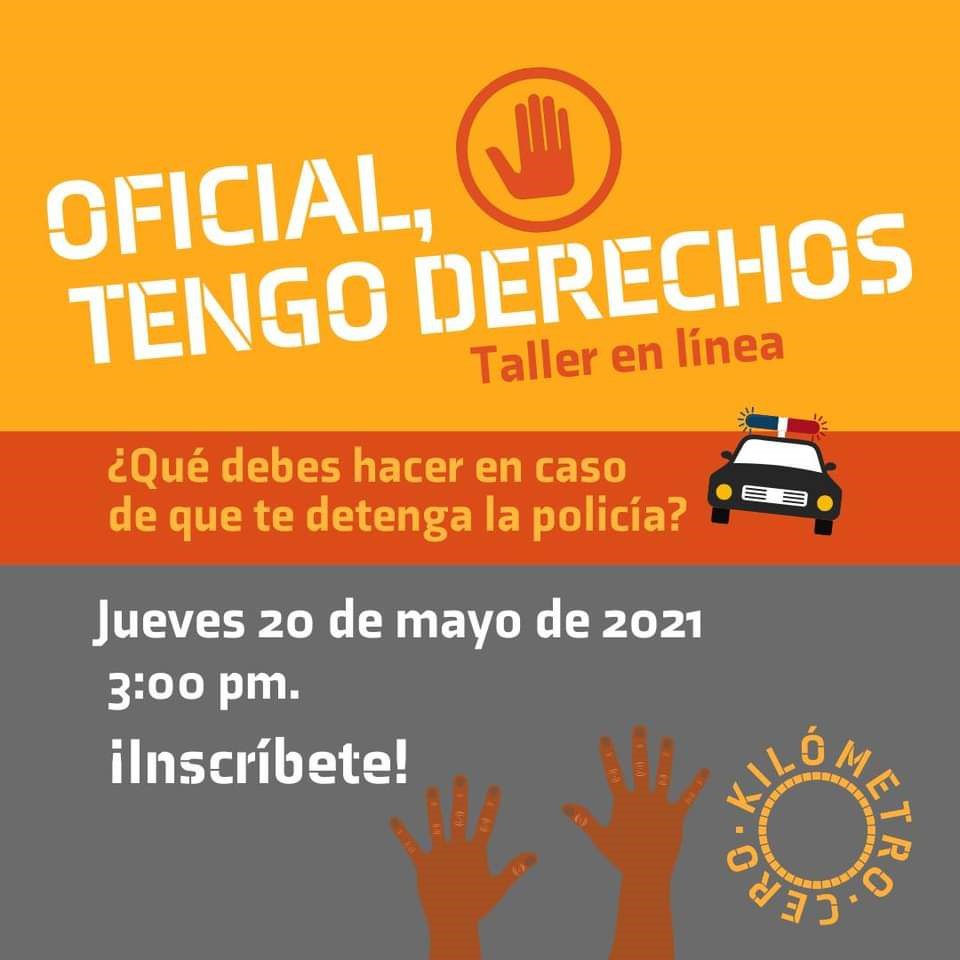By: Kristina Roth & Alli McCracken Jarrar
The 25th of May 2020 was a day that changed the world forever. Officer Derek Chauvin and three other Minneapolis Police Officers tortured and extrajudicially executed George Floyd. Darnella Frazier, a 17-year-old Black woman, filmed the murder, released the video, and the planet erupted with rage at yet another police killing of a Black man in the USA. George Floyd was a father, a brother, a son, a partner, and a friend. His life was cut short, over a call to the police over a potentially fraudulent cash bill.
The video of George Floyd’s killing by Minneapolis police officers shocked the global conscience, but abusive and excessive policing of Black people by law enforcement officers is as old as policing in the USA itself. In the South, the profession of policing has early roots in the slave patrols created by slave masters who used these brutal patrols to retrieve, beat, punish and often kill their property – Black bodies.
Systemic, anti-Black racism is at the core of the current US criminal legal system, as is evident in the killings of Black and Indigenous people, who are most significantly overrepresented among other races. In the USA, two different justice systems persist: one where some people get tickets, and some people get murdered for low-level offenses, and melanated people may be perceived as presenting a threat by simply being.
George Floyd was one out of over 1,000 lives taken every year at the hands of the law enforcement officers in the United States. He was another person taken from their family by violence that impacts Black, Indiginous, and brown communities every day.
George Floyd should still be alive today.
Police violence is a leading cause of death for young men in the United States. In the USA, about 1 in every 1,000 Black men can expect to be killed by police in their lifetime. Between 2015-2020, 30% of people shot and killed by police were cited as exhibiting signs of mental illness. Despite these dismal rates of violence, most law enforcement officers are not held accountable for unlawful killings, and are able to act with impunity for excessive and sometimes deadly use of force, particularly against Black people. Between 2005 and 2019, only three state or local law enforcement officers were convicted of murder in deadly force cases.
Even in the context of a pandemic, after the murder of George Floyd people spilled into the streets to protest police violence, racial discrimination, and the scourge of white supremacy, including in many countries with colonial foundations. The United States recorded its largest protests in the history of the country’s existence. People from Indonesia to New Zealand, from Switzerland to Argentina and beyond all took action in different ways, both online and offline, to demand justice for George Floyd, and show solidarity with the rights of Black people to survive interactions with law enforcement and the Black Lives Matter struggle in the United States.
They also took action to demand an end to racist and otherwise discriminatory policing and police violence in their own countries. From the movement to #EndSARS in Nigeria to the protests against police violence in Puerto Rico, the issue of state repression is horrifyingly ubiquitous across the world.
To commemorate one year since the murder of George Floyd, people from across the Amnesty International movement shared their experiences from the global uprising. These stories from 13 countries across the world show how wide-reaching the pain and outrage was felt by people all around the planet after the murder of George Floyd, and how law enforcement violence devastates local communities worldwide.
They also show how this movement truly is a global effort: while racism and human rights violations by the police in the United States are horrific, they are global issues that impact every country, and they require a global effort to end them. People have shown up, and the movement won’t be stopped.
Peru
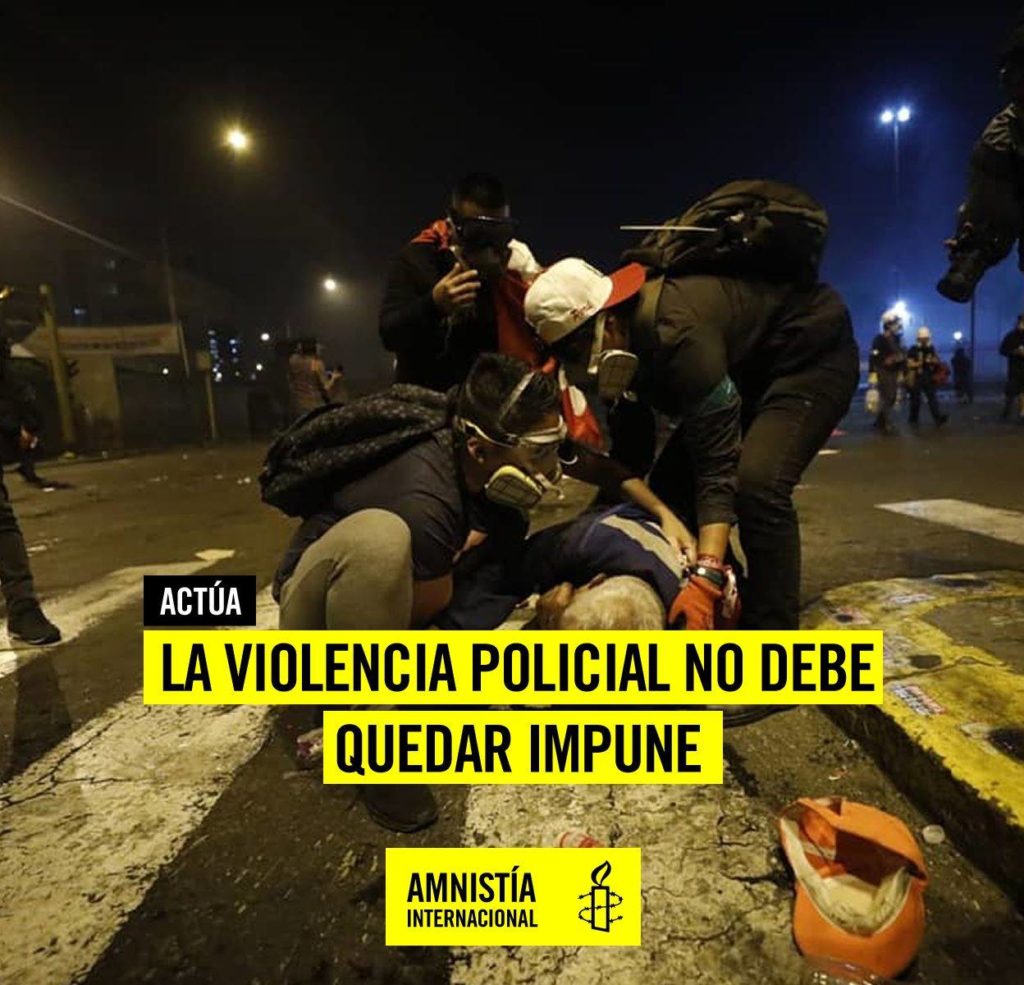 In Perú, the phrase “please, I can’t breathe” resonated with those who took action on AI Perú’s petition calling for justice for George Floyd, as well as those who signed demanding an end to police violence in their own country. Perú is a country that is experiencing high social unrest. In November 2020, Perú experienced an unprecedented political crisis- three presidents in less than a week. Currently, AI Perú has an active campaign on the right to protest in the wake of the demonstrations triggered by this political crisis last year and the subsequent violent police repression. Information provided by Amnesty International Perú |
Nigeria
|
Nigeria inherited a colonial police law enacted in 1948, 12 years before Nigeria gained independence.This law was only amended in 2020, when a new Police Act was passed into law. For years, Amnesty Nigeria has documented the issue of law enforcement violence. The widespread incidents of violence by the security forces and the entrenched culture of impunity have seriously undermined public confidence in Nigeria’s security system. Few victims of unlawful killings or other human rights violations by the security forces have received justice or reparation. To commemorate 100 days since the Lekki tollgate shooting by authorities, Amnesty Nigeria released a statement and published an an article which explains the background and centers the call for justice. |

Nigerian youths seen waving the Nigerian national flag in front of a crowd in support of the ongoing protest against the unjust brutality of The Nigerian Police Force Unit named Special Anti-Robbery Squad (SARS) in Lagos on October 13, 2020. – Nigerians took to the streets once again on October 13, 2020, in several cities for fresh protests against police brutality, bringing key roads to a standstill in economic hub Lagos.
Demonstrations organised on social media erupted earlier this month calling for the abolition of a notorious police unit accused of unlawful arrests, torture and extra-judicial killings.
The government gave in to the demand on October 11, 2020, announcing that the federal Special Anti-Robbery Squad (SARS) was being disbanded in a rare concession to people power in Africa’s most populous nation. (Photo by Benson Ibeabuchi / AFP) (Photo by BENSON IBEABUCHI/AFP via Getty Images)
Amnesty Nigeria has an active petition demanding justice for victims of police violence. In late 2017, Nigerian human rights defenders and activists launched a massive campaign called #EndSARS to raise awareness about the human rights violations committed by the Special AntiRobbery Squad (SARS), a unit of the Nigerian police tasked with fighting violent crimes such as robbery and kidnapping. In 2020 Amnesty Nigeria released a report on this issue called Time to end impunity – Torture and other violations by the Special Anti-Robbery Squad.
Information provided by Amnesty International Nigeria
Indonesia
|
In 2020, Amnesty Indonesia hosted an online concert called Sounds Rights to raise the awareness among the Indonesian public about the issue of police violence in the USA and Indonesia. Speakers discussed the links between people struggling against police violence in the United States and violations by security forces against the people in the West Papauan movement for independence from Indonesia. 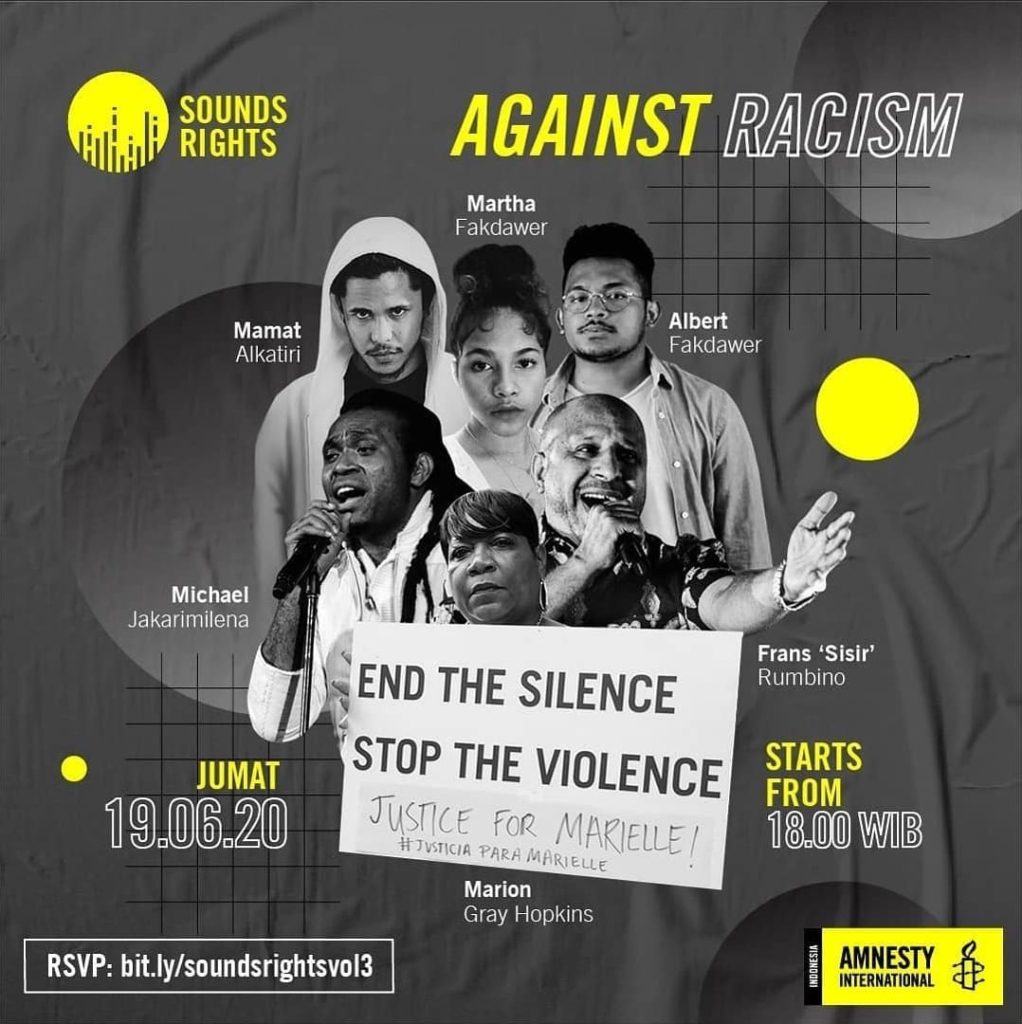 AI Indonesia also organized Akademi HAM, an online human rights education webinar to educate and provide information for the general public on this current pressing issue. This information was submitted by Amnesty International Indonesia |
Switzerland
|
The call that #BlackLivesMatter resonated a lot in Switzerland. The Swiss section of Amnesty International supported the global petition to demand justice for George Floyd with almost 10,000 signatures. Amnesty Switzerland is also tackling racism within Switzerland, which was the focus of the Swiss Section’s Magazine March 2021.
|
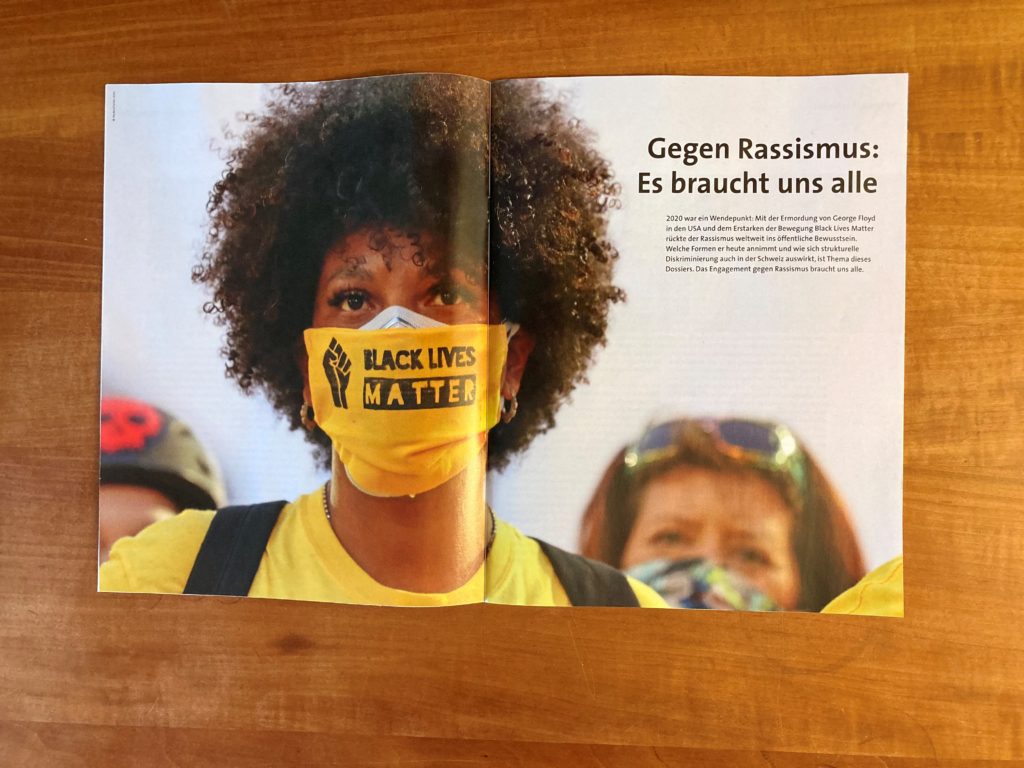
To support the initiative of grassroots activists, Amnesty Switzerland intervened as a third party in a pending case at the European Court of Human Rights on racial profiling. In its submission, Amnesty International points out Switzerland’s serious failures to prevent and effectively investigate ethnic profiling by Swiss authorities.
Information provided by Amnesty International Switzerland
Southern Africa

In southern Africa, Amnesty International has condemned the use of force by police and security officials in Angola during the COVID-19 containment measures. Amnesty also worked on a joint statement with other organizations on COVID-19 containment measures in the region, including the use of force by authorities. These actions are within the context of the colonial history in which state agents were unleashed on Black bodies as a means to control them. This information was submitted by the Amnesty International Secretariat Regional Office in Southern Africa France
Puerto Rico
Sweden
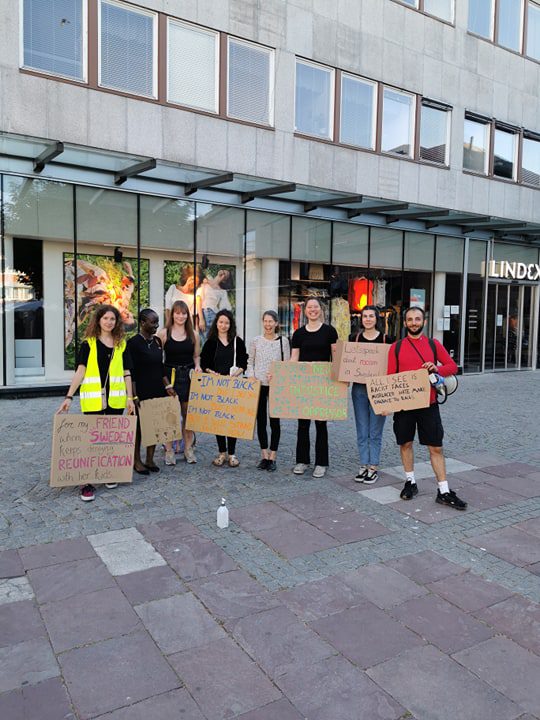 They’ve also initiated a pilot study examining reports of excessive violence and racial profiling among private security companies in Sweden. This information was submitted by Amnesty International Sweden |
Argentina
 Because of the pandemic and subsequent lockdown, Amnesty in Argentina got creative on social media about exposing police violence and racism and sharing solidarity with the uprising in the USA. They shared images on their social media of the protests worldwide, and they participated in the global #BlackOutTuesday, when people worldwide posted a black box to draw attention to excessive use of force by the police. This information was submitted by Amnesty International Argentina |
Norway
|
Amnesty International Norway published the petition Justice for George Floyd, which got 201,684 signatures, a record number for Norway, which shows how incredibly important this issue is to the Norwegian people. When their petition reached over 200,000 signatures, they put up a banner at the Nobel Prize Center in the capital of Norway. They launched a digital concert, starring Norwegian musicians and celebrities. 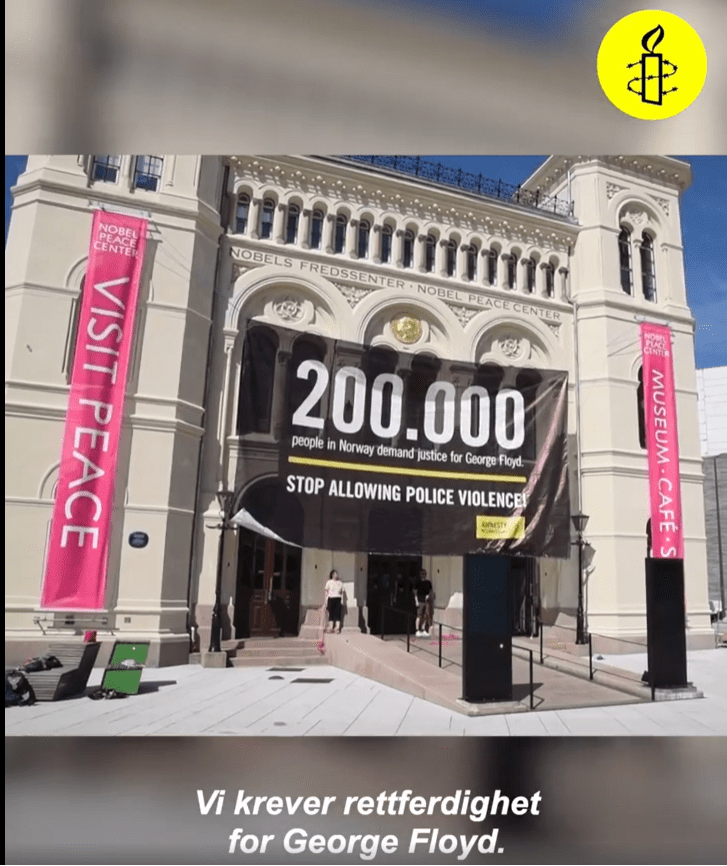 Because of COVID-19, AI Norway encouraged their activists and supporters to join a digital demonstration on Instagram. They currently have an education program where they discuss racism and discrimination, which is available for activists and in schools. This information was submitted by Amnesty International Norway |
Guinea
|
In 2020, Amnesty International documented the use of excessive force by Guinean security force in the weeks following the country’s presidential election, which led to more than a dozen killed, including a 62-year-old man who have been tortured to death, and the arrest of hundreds during protests or police operations in pro-opposition neighborhoods. |
Austria
|
In Austria, people took to the streets, which you can watch in this great video by Amnesty Austria. They also posted “7 things you can do against racism.” Amnesty Austria has worked on police violence at the national level for a very long time. They published their own report at the end of 2019 and continue to do research on it. 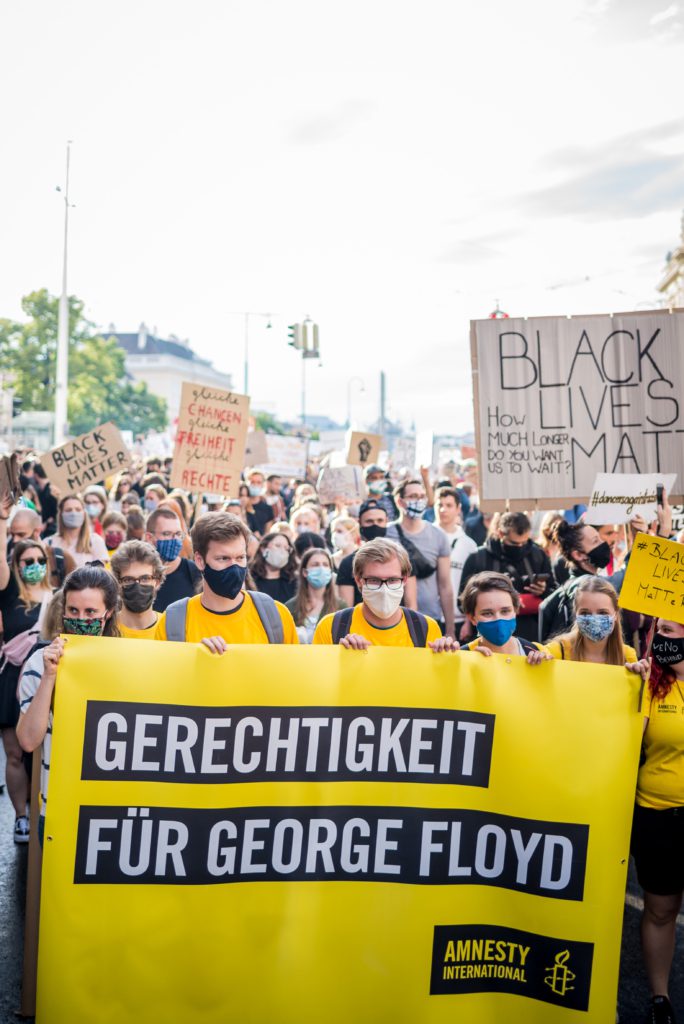 This information was submitted by Amnesty International Austria |
New Zealand
 In New Zealand, people took to the streets in cities across the country to say loud and clear: #BlackLivesMatter! From sidewalks to school groups, people around the country “took the knee,” a symbol of opposition to police violence. This information was submitted by Amnesty International New Zealand |
This summer, as a result of George Floyd’s murder, the UN Human Rights Council took up an emergency resolution on the promotion and protection of the human rights and fundamental freedoms of Africans and of people of African descent against excessive use of force and other human rights violations by law enforcement officers.
The High Commissioner on Human Rights Michelle Bachelet noted in her remarks on the resolution, “We must address the legacies of enslavement, the transatlantic trade in enslaved Africans, and its context of colonialism. We must acknowledge centuries of racially discriminatory policies and systems that followed the formal abolition of slavery.”
We must not lose sight of the history that persists in the way that law enforcement is carried out today, nor the pain it has caused that has devastated generations of families.
Despite the settlement in the George Floyd civil lawsuit and the guilty verdict against officer Derek Chauvin, there can be no real justice for this horrific crime. For too many families directly impacted by violence inflicted by law enforcement officers, there can never be justice. States must seek to adopt measures of accountability for violating people’s human rights, and we must look closely at the size and scope of law enforcement in daily life, including situations in which an armed responder too often results in a deadly encounter.
George Floyd’s six-year-old daughter, Gianna, said she knew her father would change the world, and she was right. We must move forward, with the history that got us here in mind, and work to embrace systems of public safety that respect all people’s human rights to life, to be free from discrimination and to equal protection under the law.
Kristina Roth is the Senior Advocate for the Criminal Justice Program at Amnesty International USA. Alli McCracken Jarrar is Amnesty International’s Campaigner for North America.


